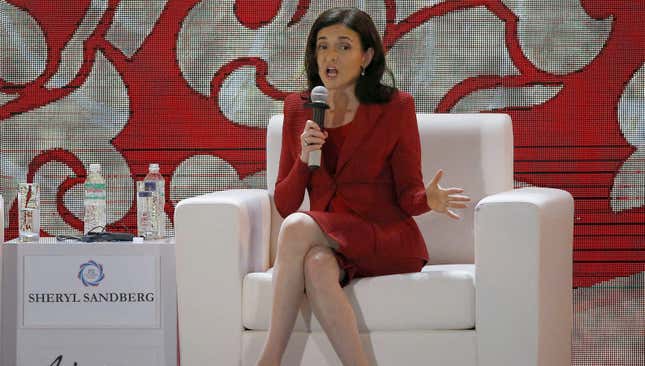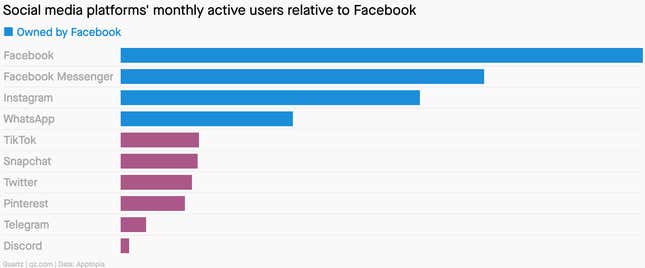To modern workers everywhere,
It’s FAANG week here at The Memo, with nuggets about the goings-on at all Big Five tech companies. Let’s kick things off with the question my editor posed to me last fall: “What ever happened to Sheryl Sandberg?”
My editor was struck by the fact that the invitation to a press conference to discuss Lean In and McKinsey’s most recent annual report on women in the workplace hadn’t mentioned Sandberg. It was a reminder of just how much Sandberg’s role in the public sphere seemed to have changed in the wake of Facebook’s crises over everything from privacy violations to human rights and election interference. Where Sandberg had once been a driving force in international conversations about gender equality, Facebook’s most frequent ambassador in the media, and a feminist icon in her own right, she’d gone comparatively quiet in the past couple years.
And so I set about trying to understand what was going on with Sandberg these days, while also fretting that my story might perpetuate what I suspected was a distinctly gendered idea that her influence is on the decline. As COO of the social-media giant, after all, Sandberg remains perhaps the most powerful woman in business. Radical Candor author Kim Scott, who worked for Sandberg at Google, told me: “Find me the 50-year-old male [leader] of a major company that he really helped to build and people asking if his career is waning.”

In the end, Sandberg’s critics and her allies, like former US Treasury secretary Larry Summers (a Sandberg mentor), and Wharton professor Adam Grant (Sandberg’s Option B co-author) agree that she remains quite powerful at Facebook, if less visible outside the company. What’s more, it seems Facebook’s scandals have only strengthened her commitment to it.
“The problems are hard, but there aren’t a lot of problems like them because of the impact the product has on so many people,” Debbie Frost, who worked for Sandberg at Facebook and now advises her foundation, told me. “If you want to be a good steward of the company, you don’t leave.”
What remains an open question, to me, is whether it’s even possible to be a good steward of a company that has so many thorny issues. Facebook’s scandals have dragged Sandberg’s reputation down. Can she—or anyone—lift Facebook’s reputation up? —Sarah Todd
Read Sarah’s full article here.
Six things we learned this week
Zoom is adapting to the hybrid workplace. The company is rolling out new features that aim to put virtual and remote participants on more equal footing.
Mozilla and LinkedIn are experimenting with company-wide vacations. It’s one way to get employees to truly unplug.
Remote work can be good for the environment, too. India’s largest IT services firm reduced its carbon footprint by 49% over the last year.
Amazon will stop screening job applicants for weed. That should help the e-commerce giant as it looks to aggressively step up hiring.
American teens are in high demand for summer jobs. The US labor shortage means that teens are getting higher wages and more schedule flexibility.
Restaurateur Daniel Boulud created new projects to stay busy during the pandemic. He tells Quartz, “I don’t think I would have done well if I had to stay home and do nothing.”
It’s a fact!
Forty-five percent of college students say they’re now considering careers in health or science in the wake of the pandemic.
Upcoming workshop
As offices slowly reopen, many of us who adapted to working from home are wondering what comes next. What does a hybrid office look and feel like? And how do we ensure that office returnees and those who remain remote feel equally heard in meetings, similarly plugged into company culture, and fairly assessed and treated when it comes to promotions and talent development?
Join us for our last virtual workshop of the season, How to get the most out of hybrid, this Thursday, June 10, from 11 am – 12 pm US Eastern time.
Register here for this free event.
30-second case study
Apparently, even Apple’s fancy $5 billion campus can’t compete with the perks of working from home. A group of Apple employees penned a letter protesting the company’s recent announcement that they will be required to come to the office three days a week (Tuesdays, Wednesdays, and Thursdays), starting in September.
The letter thanks Apple for considering new rules for its more than 100,000 employees, but says that employees need more flexibility to shape remote work around their own schedules and needs. “For many of us at Apple, we have succeeded not despite working from home, but in large part because of being able to work outside the office,” the letter states. The letter also argues that a one-size-fits-all office policy runs counter to Apple’s diversity and inclusion efforts, since with differences come “different needs and different ways to thrive.”

The takeaway: For companies coming up with their own reopening plans, Quartz senior reporter Lila MacLellan suggests that Apple employees’ list of requests could serve as a useful road map. Those requests include coming up with a clear plan of action about how to accomodate people with disabilities both onsite and offsite, and allowing individual teams to determine the remote-work policies that work best for them.
The question of how much autonomy to give people when it comes to remote work isn’t actually that difficult, according to Lindsay Lagreid, a senior advisor at Limeade Institute. “The irony is the answer is actually pretty simple if you trust your people and give them the freedom and flexibility that they’ve had for the last 18 months to make decisions about when and where and how they do their work. Problem solved.”
Words of wisdom
“You don’t choose your passions, your passions choose you. How they are formed, you’re never completely sure. But I do think you get imprinted somehow early on … Space is like that for me. I watched Neil Armstrong step onto the moon when I was 5.” —Jeff Bezos in a 2017 interview
Bezos announced this week that he’ll be heading to the edge of outer space this summer, two weeks after he steps down as CEO of Amazon, aboard the first passenger flight from the space firm he founded in 1999, Blue Origin.
ICYMI
Working at Netflix comes with plenty of perks. But job security is not among them.
Netflix co-founder and co-CEO Reed Hastings famously asks managers to use the “Keeper Test” to determine if employees deserve to keep their jobs. He explains the test in his book No Rules Rules:
If a person on your team were to quit tomorrow, would you try to change their mind? Or would you accept their resignation, perhaps with a little relief? If the latter, you should give them a severance package now and look for a star, someone you would fight to keep.
In this gem from our archive, Quartz senior reporter Sarah Todd explores whether the Keeper Test might be a useful management principle for other companies to adopt—or whether, as some former Netflix employees claim, it creates a “culture of fear” and performance anxiety.
Quartz field guide interlude

Facebook owns four of the world’s most popular social platforms, illustrating the extent to which the company was able to consolidate its power over social media over the past decade.

To read about how up-and-coming social media platforms like Clubhouse and TikTok are challenging Facebook’s dominance, check out this week’s field guide.
Not yet a Quartz member? Sign up now for a 7-day free trial.
What would you do?
When news broke last week that Google’s now-former head of diversity Kamau Bobb had authored an antisemitic blog post back in 2007, the outrage was understandable. Google ultimately opted not to fire Bobb, instead reassigning him to focus on STEM work.
The episode is a timely reminder that workplaces need to include antisemitism in their diversity and inclusion discussions—and that anyone, even a DEI expert, can be capable of holding prejudiced views. It’s also an opportunity to reflect on when it’s appropriate to give employees second chances should past problematic online behavior surface, and when firing them is the right (and perhaps only) option.
We came up with a few questions worth asking under such circumstances:
- How long ago did the employee make the comments in question, and how old was the person at the time?
- Do they have a history of repeatedly making derogatory comments?
- Have they since rejected the harmful views they once espoused?
- Are they willing to own up to the fact that their comments hurt people?
- Have they demonstrated through their speech and behavior over the ensuing years that they have truly changed?
What other questions should be asked in situations like Google’s? Send us an email:
Office tunes: This week’s edition of The Memo was composed to “Mantras” by singer-songwriter Ellen Winter, a perfect tune when you’re in need of an ego boost. As Winter chants: “Confidence is crucial.”
You got the Memo!
Our best wishes for a breakthrough week. Please send any confidence-boosting songs and space-tourist dreams to [email protected]. Get the most out of Quartz by downloading our app and becoming a member. This week’s edition of The Memo was produced by Sarah Todd and Heather Landy.
